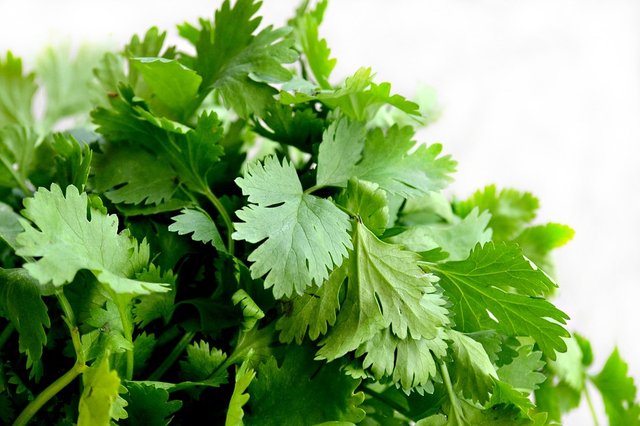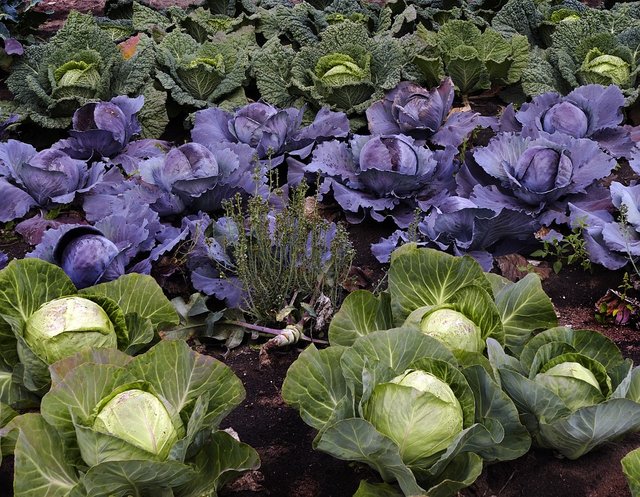Genetics and your Sense of Taste

Today in the “general” room of steemit.chat, @steemsausage was proudly telling me about the meal she had been preparing for an hour. Then her roommate came home and complained about the coriander in it. It’d “taste like a washcloth”.
But why does he hate the taste so much, while @steemsausage said that “if that was the only food left on earth, [she] would be happy having one every day”? It seems a bit more extreme than just the usual difference of “I don’t like this” and “I like this”.
For once, the answer is not hormones but genetics.
To a certain amount of the population (21% of East Asians, 17% of Europeans and 14% of people with African roots), coriander tastes like soap, or something similarly awful.@suesa
Some of my North American readers might now wonder what I am talking about, what is coriander? Coriandrum sativum is also called cilantro. You had to be that extra, didn’t you?

Interestingly, the genes that are suspected to cause this extreme dislike for coriander aren’t genes linked to tasting but to smelling. One of them is called OR6A2. It’s responsible for the production of a receptor that recognizes (aldehyde chemicals]( https://en.wikipedia.org/wiki/Aldehyde), which can be found in coriander. For some, that brings a pleasant smell and thus taste - for others it tastes like soap or a washcloth.
One researcher in the publication I read about this (linked below) recommended crushing the coriander which causes the aldehyde to be broken up. They even provided a recipe for a pesto-sauce with the herb.
1/2 cup [c. 75g] toasted almonds
3 cups coriander leaves and tender stems (about 2 bunches)
1 or 2 garlic cloves
1/2 cup [120ml] extra virgin olive oil
2/3 [c. 70g] cup grated aged sheep’s milk cheese like Nisa, Serpa or pecorino-Toscano
Source
If you’re sensitive to coriander, you should totally try this out and then tell me if it worked. Do it, for science!
OR6A2 isn’t the only gene that can make you hate certain foods. TAS2R38 (who comes up with this dumb names) encodes a receptor that allows you to taste so-called glucosinolates, which taste bitter. They can be found in kale, broccoli, cauliflower, cabbage, mustard and several more plants from the brassica family.

Yes, all the plants I just named are related to each other. In fact, they’re basically all descendants of the wild mustard. Take that, GMO-opponents!
TAS2R38 is probably also the cause why some people think wine tastes bitter. They’re called “tasters”, those who don’t taste this bitterness are “non-tasters”. Maybe that explains all those people who can drink kale smoothies with no issue, I always thought it’s disgusting.
Aside from non-tasters and tasters, there are also supertasters who have more fungiform papillae (the bumps on your tongue), which hold more taste buds. The difference is 15-35 papillae in a circle with a 6-millimeter diameter (I wonder who measured this) to 35-60 in the same area.
The result is that bitter tastes like in coffee are absolutely disgusting, while sweet and sour are a lot stronger.
Especially sweet and sour taste can be enhanced for normal tasters too though, by stress. Researchers found that healthy, stressed individuals are a lot more sensitive to those two tastes.

In contrast, people suffering from anxiety and depression might taste less because of lower serotonin and dopamine levels. Increasing the amount of these neurotransmitters also increases the sensitivity to taste again!
Smell and taste are complex senses, influenced by many genes. Before I end this post, I wanted to present a genetic disease to you, which, among other things, impacts the sense of smell.
The Kallmann syndrome is passed down on the X chromosome and is recessive, which means that if there’s a healthy copy of an X chromosome too, it isn’t a problem. As men only have one X chromosome, the number of men who suffer from Kallmann syndrome is about 4 times as high (1 in 30,000) than the number of women (1 in 120,000).
The more visible effects are a puberty that’s either delayed or doesn’t happen because certain sex hormones aren’t produced. That comes with the usual issues (for men: micropenis, undescended testicles, possibly no facial hair, the voice doesn’t get deeper; for women: no periods) and must be treated with replacement hormones. If that doesn’t happen, those who suffer from it will be infertile.
And, as I mentioned at the beginning, it also comes with an either very weak or completely missing sense of smell. And this missing sense of smell is apparently also accompanied by a very weakened sense of taste, at least in the individual I once knew who suffered from this.
Genetics. It’s weird.
Sources:
Soapy taste of coriander linked to genetic variants
TAS2R38 taste 2 receptor member 38
Association between taste receptor (TAS) genes and the perception of wine characteristics
How stress affects your food: from distorted tastes to comfort eating
Pictures taken from pixabay.com

This could be a great tool to mess with people, starting to put a lot of coriander in all the food I make when people come over and visit. While most would enjoy the food (hopefully), there could be certain people who would think it tastes horrible unless they like soap.
The best part would be that most people wouldn't want to say it outloud. Especially if others go all "Wow this is delicious" and someone thinks "WHAT IS WRONG WITH YOU ALL?"
But that someone has to do it in silence, suffering in every single time they visit me.
That is epic! I will use that… probably…
I really recommend this to you too. I don't mind if someone takes my idea, because I'm already living in a position when nobody wants to visit me - especially if I'm cooking anything.
That is the most diabolical plan ever!

Much like why I did not ask before making the meal.... more for me!!
Ahan great reply @apsu @reggaemuffin
Hey @reggaemuffin how could I get a resteem from you? I noticed you have a lot of resteems on your blog so I was just curious? Also I am quite a reggae fan... just as a side note ;-). hehe thanks, hope you hear back from you. :D
I resteem things I like and/or feel that my followers deserve/need to know about. Hope that helps :)
That's really true, only meaningful and good content should be resteemed. Respect.
You are a fucking faggot
Bad choice of words :)
@reggaemuffin dear have a look on my recent post i have posted some thing on you.
Dont mind if this way un appropriate
Really Interesting post. Thumbs up
yuumy

"Who comes up with these names" believe it or not there is actually a system for gene nomenclature (set by the HUGO gene nomenclature committee), just like there is for naming chemicals... thankfully we're never forced to learn the in's and outs of the HUGO system in biology class (poor oganic chemists!).
I think you've actually just given me a great idea for a blog post though :)
Thanks!
Shhhh I know that there are systems and stuff. But the names still suck :P
And don't remind me of my organic chemistry class. IUPAC sucks.
Haha, honestly they sound so random I can barely believe it takes a whole comittee what could be done with a random number generator!
There's also a polymorphism making you hyper-sensitive to a compound found in pork. My boss is a carrier, and a barbecueing with her is no fun at all ;-)
I read that too during my research but didn't find the correlating gene so I left it out :P
I wonder if the cultures who are non-pork eaters are afflicted with this hyper sensitivity more so than the cultures who eat pork?
interesting, i'll blame my genetics the next time i try something i don't like and show them this article. i guess im a part of the 20% that dislike cilantro.
A very interesting post. One of the Chefs at work loudly always shouts that coriander tastes just like soap and that we've all been brainwashed. I think he'll appreciate being right for once, in a manner of speaking.
Thank you for telling me what is wrong with me :-) Me and most of my Bulgarian friends really hate the taste of cilantro, we all think it's too strong and yeah, taste like a soap. But we love parsley, I could eat parsley with a spoon for example. I have a lot of latino friends and it's exactly the opposite way, they love cilantro, but parsley it's too strong for them and they hate it. I always thought that is because we are used to the flavour of parsley because it is used for many salads, dressing and dishes,and Bulgarians don't use a lot of cilantro that's why we dislike it, but now I know - it's in my genes. Thank you @suesa !
I am a "non-taster" we checked by PCR and restriction digest at my previous job just for fun.
Which makes sense because I don't find broccoli and the like bitter.
Hi there,
New to steemit. Very awesome post! As a foodie and future doctor, I love reading articles like this! The science behind food/genetics behind taste is fascinating! Thank you for enlightening us!
Coriander is called "Efo ebolo" in my native language. I really don't like it much because it gives me itchy tongue. I never knew it was due to genetics. Thanks for sharing this information @suesa. As a microbiologist I'd do more research on this. Your post has been helpful. Genetics really is weird. Lol
As a microbiologist, you should totally join the steemit science community on steemit.chat in the #steemSTEM channel!
Am really happy to join. Thanks
Superinteresting article again! I really love you diving into subjects and give us a lot of answers :) I personally like coriander but its one of those herbs wich you either like or dont like. There is not much of a between with that one.